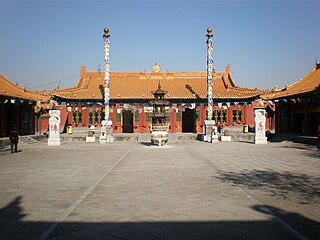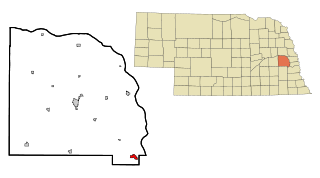Hanyu Pinyin, often abbreviated to pinyin, is the official romanization system for Standard Chinese in mainland China and to some extent in Taiwan. It is often used to teach Standard Mandarin Chinese, which is normally written using Chinese characters. The system includes four diacritics denoting tones. Pinyin without tone marks is used to spell Chinese names and words in languages written with the Latin alphabet, and also in certain computer input methods to enter Chinese characters.

Cry Freedom is a 1987 British-South African epic drama film directed by Richard Attenborough, set in late-1970s apartheid era South Africa. The screenplay was written by John Briley based on a pair of books by journalist Donald Woods. The film centres on the real-life events involving black activist Steve Biko and his friend Donald Woods, who initially finds him destructive, and attempts to understand his way of life. Denzel Washington stars as Biko, while actor Kevin Kline portrays Woods. Cry Freedom delves into the ideas of discrimination, political corruption, and the repercussions of violence.
The South African Students' Organisation (SASO) was a body of South African students who resisted apartheid through political action. The organisation was formed in 1968, spearheaded by Steve Biko, and played a major role in the Black Consciousness Movement.
The Moraitis School is a co-educational private school in Athens, Greece. It is located in Psychico, a suburb north of the Greek capital. In student population terms, the Moraitis school is one of the largest private schools in Athens. Its teaching aims at university entry.

Sênggêzangbo, or Shiquanhe, is the main town of Ngari Prefecture, Tibet. Shiquanhe is located on the confluence of Sênggê Zangbo and Gar River.
The SASM/GNC/SRC romanization of Tibetan, commonly known as Tibetan pinyin, is the official transcription system for the Tibetan language in the People's Republic of China for personal names and place names. It is based on the Lhasa dialect of Standard Tibetan and reflects the pronunciation except that it does not mark tone. It is used within China as an alternative to the Wylie transliteration for writing Tibetan in the Latin script within academic circles; Wylie transliteration is more commonly used.

Samana is a city and a municipal council in Patiala district in the Indian state of Punjab.
Mongolian names have undergone a number of changes in the history of Mongolia, both with regard to their meaning and their source languages. In modern day, Inner Mongolian naming customs are similar to Mongolia, but do display some differences.

Da Zhao Temple or Wuliang Temple, or Ih Juu in Mongolian, is a Tibetan Buddhist monastery of the Gelugpa order in the city of Hohhot, Inner Mongolia in North China. It is the oldest and largest temple in the city and is located West of Dana Street in the Yuquan District.
The Journal for the Academic Study of Magic (JSM) was the journal of the Society for the Academic Study of Magic (SASM), a multidisciplinary group formed in 2002 by Alison Butler and Dave Evans of the University of Bristol. The group was composed of scholars studying all aspects of magic and esotericism.
Murphy Morobe is an historical figure from South Africa's anti-apartheid movement.
Folkington Manor is a grade II listed country house situated in the hamlet of Folkington two miles (3.2 km) west of Polegate, East Sussex, England.

Internal resistance to apartheid in South Africa originated from several independent sectors of South African society and alternatively took the form of social movements, passive resistance, or guerrilla warfare. Mass action against the ruling National Party government, coupled with South Africa's growing international isolation and economic sanctions, were instrumental factors in ending racial segregation and discrimination. Both black and white South African activists such as Steve Biko, Desmond Tutu, Nelson Mandela, Harry Schwarz, and Joe Slovo were involved with various anti-apartheid causes. By the 1980s, there was continuous interplay between violent and non-violent action, and this interplay was a notable feature of resistance against apartheid from 1983 until South Africa's first multiracial elections under a universal franchise in 1994.

Delingha, or Delhi, is the seat of the Haixi Mongol and Tibetan Autonomous Prefecture in northern Qinghai province, China. It is located approximately 200 kilometres (120 mi) southeast of the Da Qaidam Administrative Region. It is a mainly industrial county-level city. The Bayin River divides the city into two parts: Hedong and Hexi. Because the prefecture seat is located in Hedong, it is slightly more flourishing than Hexi, which is chiefly agricultural.

Xinjiang, officially the Xinjiang Uygur Autonomous Region (XUAR), is a provincial-level autonomous region of China in the northwest of the country. It is the largest Chinese administrative division and the eighth largest country subdivision in the world, spanning over 1.6 million km2. Xinjiang contains the disputed territory of Aksai Chin, which is administered by China and claimed by India. Xinjiang borders the countries of Mongolia, Russia, Kazakhstan, Kyrgyzstan, Tajikistan, Afghanistan, Pakistan (Gilgit-Baltistan), and India. The rugged Karakoram, Kunlun, and Tian Shan mountain ranges occupy much of Xinjiang's borders, as well as its western and southern regions. Xinjiang also borders Tibet Autonomous Region and the provinces of Gansu and Qinghai. The most well-known route of the historical Silk Road ran through the territory from the east to its northwestern border. In recent decades, abundant oil and mineral reserves have been found in Xinjiang, and it is currently China's largest natural gas-producing region.
The former State Administration of Surveying and Mapping, Geographical Names Committee and former Script Reform Committee of the People's Republic of China have adopted several romanizations for Chinese, Mongolian, Tibetan, and Uyghur, officially known as pinyin, Regulation of Phonetic Transcription in Hanyu Pinyin Letters of Place Names in Minority Nationality Languages and Orthography of Chinese Personal Name in Hanyu Pinyin Letters. These systems may be referred to as SASM/GNC/SRC transcriptions or SASM/GNC romanizations.

SASM (SimpleASM) — a simple Open Source crossplatform integrated development environment for NASM, MASM, GAS and FASM assembly languages with syntax highlighting and debugger.









